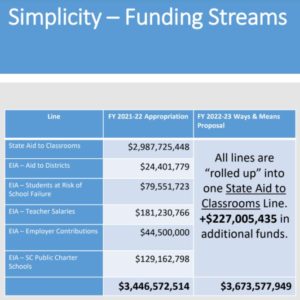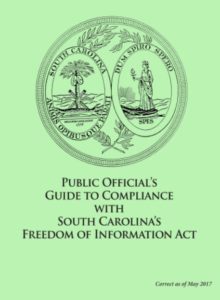STATEHOUSE REPORT | ISSUE 21.10 | MARCH 11, 2022
BIG STORY: S.C. schools facing record shortages of teachers, support staff
NEWS BRIEFS: House to kick off debate Monday on $14 billion budget
LOWCOUNTRY, Ariail: An ark
COMMENTARY, Brack: Follow the law by making records, meetings always open for all
SPOTLIGHT: S.C. Senate Democratic Caucus
MY TURN, Ulbrich: Shore up the state’s retirement system
FEEDBACK: On trust in government and teaching racism
MYSTERY PHOTO: Coastal scene
S.C. schools facing record education staff shortages

By Skyler Baldwin | The shortage of teachers and support staff in South Carolina schools is poised to only get worse, despite the legislature’s best efforts, according to teachers, education officials and advocates. Why? Not only are teachers leaving in droves, but international teachers who have provided temporary relief aren’t a long-term solution.
A November 2021 report from the Center for Educator Recruitment, Retention and Advancement (CERRA) found about 6,900 South Carolina teachers from the 2020-21 school year did not return to a position in the same district this year. That is a 15.5 percent increase compared to departures reported last year.

Between October 2021 and February 2022, 977 teachers throughout the state left their classrooms, risking license suspensions, contract breaches and more, according to Sherry East, president of the South Carolina Education Association. And, she said, her office gets multiple calls per day from teachers looking to quit at the end of the school year.
“A teacher’s working conditions are your child’s learning conditions,” East said. “If we want to do what’s best for our children, we need to fix the working conditions in our schools. They’re so unbearable, 977 people left their job — and it’s hard for a teacher to leave mid-year. That’s alarming. “
The recent exodus puts teacher vacancies in the state at nearly 1,100, East said, and the problem is likely to get worse. The state has outsourced more than 1,000 teaching positions to international teachers, according to a new, unpublished report from the state Office of Educator Services. These teachers can only stay on work visas for two to three years, sources said.
“So you really have more than 2,000 empty classrooms in my mind,” East said.
More shortages than just in classroom
But staffing shortages in schools aren’t limited to the classroom.
“School staff shortages go well beyond just teachers,” said a high school teacher in the Dorchester County School District who asked to remain unnamed.
The shortage of support staff is stretching teachers still in the classroom thinner than ever before, she said. Teachers are serving lunch in the cafeteria during their own lunch breaks, covering each other’s classes due to the lack of substitutes, cleaning their own classrooms each day and even driving buses after school.
 As of November 2021, South Carolina was short approximately 750 school bus drivers, according to Ryan Johnson, chief communications officer for the S.C. Department of Education. The gap represents 14 percent of the state’s 5,600 state-owned bus fleet.
As of November 2021, South Carolina was short approximately 750 school bus drivers, according to Ryan Johnson, chief communications officer for the S.C. Department of Education. The gap represents 14 percent of the state’s 5,600 state-owned bus fleet.
And the state’s broken record of shortages keeps playing, as one of the biggest driving forces behind the problem remains the low pay.
“Certified staff salaries are still staggeringly low — custodial work is still at about $10 per, and you can get more than that working at Wendy’s,” said Charleston Teacher Alliance director Jody Stallings. “That’s a big part of it. It’s so hard to find that support staff, and that’s the kind of staff you need.”
The state Department of Education invested a portion of its funds from the American Rescue Plan’s Elementary and Secondary School Emergency Relief Fund to bump teacher pay in the state, Johnson said in a statement.
“Prior to the start of the 2022 legislative session, the SCDE’s submitted a budget request that includes a $162 million increase in teacher salary for the 2022-2023 fiscal year,” he said. Superintendent [Molly] Spearman challenged the General Assembly to raise starting teacher pay to $40,000 during our agency’s budget hearing in January. The House Ways and Means Committee included this in their budget that is moving to the House floor next week.”
But the legislation does not include language pertaining to support staff.
“In South Carolina, in a time when we have all this money … we’re not taking care of the people that run our state,” East said. “We need to take a hard look at what we value in South Carolina and ask, ‘Do we value our state workers, our teachers and the people that make living here safe and give us an educated workforce?’ Because from what I’m seeing, we do not.”
Skyler Baldwin is a reporter with the Charleston City Paper. Samantha Connors of the City Paper staff contributed to the story. Have a comment? Send to: feedback@statehousereport.com.
House to kick off $14 billion budget debate Monday
Includes new paradigm on education funding

Staff reports | S.C. House lawmakers on Monday will start debate on a $14 billion budget filled with never-imagined surpluses. With so much money at stake, most legislators have been made happy one way or another. That is expected to lead to little contentious discussion on the floor and relatively quick passage.
An internal slide show presentation highlights four major priorities of the House Ways and Means Committee’s budget plan: reducing taxes, fixing roads, managing reserves and giving raises to state employees, including big ones to teachers.

Taxes: The House plan envisions $1 billion in tax cuts, including more than $600 million in annual income taxes that will grow to $1 billion in five years. On Thursday, state senators unanimously passed a separate – and bigger – tax relief bill that provides similar cuts to the income tax rate as well as $1 billion in one-time rebates to state taxpayers.
Roads: The House budget plan calls for $1 billion in new spending on roads.
Reserves: It provides for $1 billion “saved in reserves.”
Raises: It calls for major raises to teachers and law enforcement officers, as well as a $1,500 bonus to state employees. According to the document, the minimum starting salary for teachers would go to $40,000 a year, up from $30,311 in 2018. The average teacher salary would jump to more than $52,000 a year.
Budget features new education funding formula
The House budget plan also envisions a new structure to fund public education that moves away from a formula that determined a base student cost among the many factors of school funding. The new plan calls for a new formula that creates a new metric – “State Aid to Classroom.”
According to the internal document, “Instead of allocating funding by building up from a base student cost, the budget proposes to allocate state dollars to districts as a percentage of the overall pot. The percentage of the overall pot each district receives is dictated by each district’s weighted per pupil count and their index of taxpaying ability.”
The document says State Aid to Classrooms in the new formula will be $4,834 average per pupil, compared to the old base student cost which (at best) was half of that. Remember, however, that the new metric includes local match and other funds, too, such as former Education Improvement Act funding for districts, at-risk students, teacher salaries, employer contributions and state public charter schools.
In other recent news:
![]() Senate OKs bill for new constitutional convention. The South Carolina Senate approved a measure Wednesday in a 27-13 vote that adds the state to the list of about 20 states seeking a convention to make changes to the U.S. Constitution. The House passed a similar measure last month. For a convention to be called, a threshold of 34 states must be met. The only constitutional convention held in the United States was in 1787. More: The Post and Courier, The State.
Senate OKs bill for new constitutional convention. The South Carolina Senate approved a measure Wednesday in a 27-13 vote that adds the state to the list of about 20 states seeking a convention to make changes to the U.S. Constitution. The House passed a similar measure last month. For a convention to be called, a threshold of 34 states must be met. The only constitutional convention held in the United States was in 1787. More: The Post and Courier, The State.
Teachers, others protest CRT bills ahead of hearing. Several organizations met on the Statehouse steps March 8 to protest five bills aiming to ban critical race theory from being taught in K-12 classrooms. More: The State.
Proposed legislation would legalize betting on horse races online. A proposed bill could allow South Carolinians to legally bet on horse races, but only through online apps. The proposal is intended to raise money for equestrian activities in the state.
S.C. Senate moves police reform bill forward. A subcommittee of the Senate’s Judiciary Committee voted March 8 to advance legislation imposing more stringent training requirements for police officers after it passed the S.C. House with police backing.
SC gas prices jump big. Gas prices in the United States are climbing to their highest level since 2008 amid Russia’s invasion of Ukraine and disruptions to the global energy market. In South Carolina, prices have jumped 50 cents per gallon in the last week to $4.07 per gallon, according to AAA.
Cunningham renews call for temporary suspension of state gas tax. South Carolina gubernatorial candidate Joe Cunningham is again calling for the state’s General Assembly to temporarily suspend the state gas tax.
McMaster appealing federal court ruling against fetal heartbeat bill. S.C. Gov. Henry McMaster’s office is appealing a federal court ruling halting South Carolina’s controversial ban on abortions after roughly six weeks.
Scott scores big win with passage of anti-lynching bill. The U.S. Senate on Monday unanimously approved a House-passed anti-lynching bill long pushed by U.S. Sen. Tim Scott, a Charleston Republican. The measure, which now goes to President Biden to be signed into law, calls for lynching to be a hate crime punishable by up to 30 years in prison. The historic bill is named to honor Emmett Till, the 14-year-old Black boy tortured and murdered in Mississippi in 1955.
Trump comes to South Carolina Saturday. Former President Donald Trump is expected to appear at an event 7 p.m. Saturday at the Florence Regional Airport in Florence. Doors for the “Save America Rally” open at 2 p.m. Among those also scheduled to appear are South Carolina Gov. Henry McMaster and Katie Arrington, who is running for South Carolina’s 1st Congressional District seat, currently held by fellow GOP member Nancy Mace. Registration required in advance. Politicos are saying the S.C. stop looks like a soft election campaign for 2024 for the former president. More: WJCL, Spartanburg Herald-Journal
Remember to spring forward. A bill passed in 2020 to help pave the way for ending daylight saving time wasn’t enough to stop this year’s “spring forward” on Sunday.
- Want more headlines every business day that are like this? Visit our friends at SC Clips.
An ark

Cartoonist Robert Ariail often interprets things a little differently, but always has an interesting take on what’s going on in South Carolina. Love the cartoon? Hate it? What do you think: feedback@statehousereport.com.
Follow the law by making records, meetings always open for all

By Andy Brack, editor and publisher | South Carolinians share a common value that public meetings and the work of government should be done in public so it is open and transparent to everyone. This is enshrouded in law as the S.C. Freedom of Information Act.
 Simply put, the law ensures the public’s business is done in public. There are a few exceptions, such as when sensitive contracts are in debate or when somebody’s job performance is being scrutinized. But on the whole, public business is supposed to be available for inspection by the public, the people who pay for our government entities.
Simply put, the law ensures the public’s business is done in public. There are a few exceptions, such as when sensitive contracts are in debate or when somebody’s job performance is being scrutinized. But on the whole, public business is supposed to be available for inspection by the public, the people who pay for our government entities.
This expectation for public work to be done in the open – in the sunshine – is not partisan.
GOP Gov. Henry McMaster supports the notion in a S.C. Press Association guide on how public officials should comply with open meetings and open records laws: “As public servants, we should always endeavor to maintain the public’s trust and confidence in their government. In that spirit, I hope you will remember ‘When in doubt — disclose,’ ” S.C. Attorney General Alan Wilson concurred: “We have an obligation not only to adhere to the letter of the law, but also live up to its spirit through compliance with every reasonable FOIA request without delay or obstruction.”
Public scrutiny is hard because it might bring to light some uncomfortable things. But lots of elected and non-elected public officials comply with the law. It’s too common, however, for those who don’t want the light of transparency to shine to slide.
An example is public access to police records. The law absolutely and clearly requires written records, such as meeting minutes, jail logs and two weeks of criminal incident reports, to be available to anyone who asks for them – without any strings attached. That means anyone – a member of the public or a reporter – should be able to walk into a police station and see an arrest report without a written request or any prior notice.
In January, checks with several police departments in Charleston County revealed how agencies skirted or blatantly disregarded the law. One agency, for example, agreed to provide information that was redacted. Another required a reporter to submit a formal written FOIA request. Others seemed unaware of the openness required by the law.
 Unfortunately, too many non-elected public officials don’t seem to understand just who they work for. They, in fact, work for the people who pay their salaries. They work for you and me.
Unfortunately, too many non-elected public officials don’t seem to understand just who they work for. They, in fact, work for the people who pay their salaries. They work for you and me.
Back in 1902 in a speech in Asheville, North Carolina, President Theodore Roosevelt addressed how the American government isn’t separate and distant from the American people: “Now the government is us – we are the government, you and I; and the government is going to do well or ill accordingly as we with sanity, with resolution, with broad charity and sound common sense make up our minds that the affairs of the government shall be managed. … No law, no leadership can possibly take the place of the exercise by the average citizen of the fundamental virtues of good citizenship – the exercise of the fundamental qualities of honesty, courage and common sense.”
Yes, the government is us. And government officials who don’t understand the Freedom of Information Act should learn it and comply. They need to start making more information available to all citizens. When in doubt, as the governor says, make information public.
And if public officials don’t or won’t? Perhaps state legislators could put some real teeth in the law and hold violators personally responsible for lazy or intentional failure to make records and meetings open. Maybe that will get the slackers’ attention. There’s no point in having a law requiring openness if some people can slide by.
Write your state representative or senator today and encourage them to put some meaningful teeth in the state’s Freedom of Information Act so that public officials do what they are supposed to – provide information so “we the people” can gauge whether the “government that is us” is using tax money properly and administering our government with, as Roosevelt said 120 years ago, “honesty, courage and common sense.”
Andy Brack, a member of the board of directors of the S.C. Press Association, is publisher of the Charleston City Paper and editor and publisher of Statehouse Report. Have a comment? Send to: feedback@statehousereport.com.
S.C. Senate Democratic Caucus
 The public spiritedness of our underwriters allows us to bring Statehouse Report to you at no cost. This week’s spotlighted underwriter is the S.C. Senate Democratic Caucus. Organized almost 25 years ago, the Caucus has played an important role in many of the historic issues facing our state. As a vibrant minority party in the Senate, its role is to represent our constituents and present viable alternatives on critical issues. The S.C. Senate Democratic Caucus remains a unique place for this to occur in our policy process.
The public spiritedness of our underwriters allows us to bring Statehouse Report to you at no cost. This week’s spotlighted underwriter is the S.C. Senate Democratic Caucus. Organized almost 25 years ago, the Caucus has played an important role in many of the historic issues facing our state. As a vibrant minority party in the Senate, its role is to represent our constituents and present viable alternatives on critical issues. The S.C. Senate Democratic Caucus remains a unique place for this to occur in our policy process.
- Learn more about the Caucus at: www.scsenatedems.org.
Shore up the state’s retirement system

By Holley Ulbrich, special to Statehouse Report | The General Assembly and the governor are tossing out ideas about tax cuts and rebates in response to being flush with cash. Perhaps they should recall that they claim to be fiscal conservatives. What’s the first priority of a fiscal conservative? Pay the bills. Reduce the debt. Specifically, commit at least some of these funds to shoring up the woefully underfunded state retirement system.

Aha, some of them respond, that’s because the retirement system is an old-fashioned defined-benefit program. Let’s solve the problem, they say, by following in the footsteps of corporations and some other state governments by making the switch to a modern, up-to-date defined-contribution program.
For those readers who don’t speak the language of pensions and insurance, a defined-benefit program promises a fixed (perhaps inflation adjusted) monthly benefit based on your salary while working and the number of years worked. A defined-contribution program leaves the size of the benefit to be paid every month to the retiree and his estimate of how long he might live.
Right now, defined-contribution programs are popular because the stock market has been performing so well, but the likelihood of that continuing indefinitely is doubtful. In simpler language, the current defined-contribution system has an insurance element. It will continue to pay as long as the beneficiary is alive, and can be adapted to protect a surviving spouse as well. You can outlive the assets in a defined-contribution program, but not a defined-benefit program. In a defined-contribution program, the risk (that retirees will live too long) falls on the worker. In a defined-benefit program, the risk falls on the employer. (A further risk with private sector pension system of their kind is the unfortunate practice of some corporations of diverting pension funds to other uses and leaving beneficiaries stranded, but one would certainly hope that a state government would not behave that way).
There are two flaws in that proposed shift. First, it won’t solve the problem of underfunding of existing commitments to current and returned state employees. Instead, it will make the problem worse by cutting off the flow of new employee contributions and state matching funds into the coffers of the state retirement system. Legislators who get a particular sweet retirement deal from the existing system will be putting their own retirement funds in jeopardy.
The second flaw is that the old system is one of the few attractions the state has to offer its generally underpaid employees. If the state is worried about retaining and attracting teachers, or prison guards,or social workers, a pay raise would be very helpful, but the defined-benefit program offers these generally underpaid workers an insurance benefit of some value. Workers who feel secure and protected about their financial future are likely to be more loyal and dedicated employees. In fact, the number of years required to qualify for full retirement benefits may well be one reason why we haven’t lost even more than the current number of teachers, prison guards and social workers
Social Security is the most familiar (and beloved) of defined-benefit programs. All attempts to convert it to a defined-contribution program have been fiercely resisted, in part because the benefit schedule is tilted toward those who earned the least when they were working. Lower- to middle-income workers who retire usually have very little saving and very little experience in asset management. If they do manage to save for their retirement, then it would be wise for them to put those funds into some kind of defined-contribution program, knowing that it will provide the possibility of growth atop their solid foundation of Social Security and defined-benefit pension.
Holley Ulbrich is Alumni Distinguished Professor Emerita of Economics at Clemson University.
Trust in government has been declining for a long time
To the editor
![]() I recently read Andy Brack’s piece on the decline in trust in government and I must agree but also point out a piece of nuance. Trust in government has been declining since the 1960s, though that is not to say that it was at a high-water mark at all times before the 1960s – we just don’t have data.
I recently read Andy Brack’s piece on the decline in trust in government and I must agree but also point out a piece of nuance. Trust in government has been declining since the 1960s, though that is not to say that it was at a high-water mark at all times before the 1960s – we just don’t have data.
As a prior academic who studied ethics and trust in government, I need to point out that the US is the only OECD country that has seen a consistent decline in government. As evidence I am providing an article I published in 2021 in just this topic.
Thank you for your commentary on this issue. I know the issues that seem philosophical but nonetheless have real impact on our country often fall by the wayside in favor of red meat issues that can drum up the base; so I greatly appreciate this piece.
– Jonathan Rauh, Summerville, S.C.
Teaching racism by not teaching racism’s history
The 21st-century skills sought by employers fall into three categories:
- Learning skills: The critical thinking skills used to process and communicate information.
- Literacy skills: These are the social awareness skills to develop savvy and informed researchers and thinkers.
- Life skills: The skills needed for an aware, well-rounded individual in their personal and work lives.
S.C.’s dumbed-down kids do not develop these skills sufficiently, to begin with. (Check the National Assessment of Educational Progress (NAEP) scores). SC’s future labor force is already deficient.
Give it time, those with kids will not be heading here. Plenty of space for the old fogies already coming in abundance to roost here. Those who want education for their kids need to move on.
The finance and economic development committees need to allocate even more money to bribe companies to relocate here. But whatever you do, continue to secret the huge sums covering over the unaddressed original sin and the sin of this coverup to buy jobs for SC.
–Fred Palm, Edisto Island, S.C.
Send us your thoughts
We receive a few comments a week and look forward to publishing. But often we can’t because we can’t verify the identity of the writer. To be published, you’ve got to provide us with contact information so we can verify your letters. Verified letters to the editor are published weekly. We reserve the right to edit for length and clarity. Comments are limited to 250 words or less. Please include your name and contact information.
- Send your letters or comments to: feedback@statehousereport.com
Coastal scene

There are a few clues in this soothing scene sent in by a reader that might help you identify this place. Where and what is it? Send your guess to feedback@statehousereport.com — and remember to include your name, home city and contact information.
 Last week’s mystery, “Lots of bricks,” showed the old Arcadia Mills No. 2, which has been converted to apartments in Spartanburg. Congratulations to those who correctly identified the photo: Elizabeth Jones of Columbia; Jacie Godfrey of Florence; David Lupo of Mount Pleasant; Pat Keadle of Wagener; George Graf of Palmyra, Va.; Allan Peel of San Antonio, Texas; Kathy Inman of Boiling Springs; Frank Bouknight of Summerville; and Jay Altman of Columbia.
Last week’s mystery, “Lots of bricks,” showed the old Arcadia Mills No. 2, which has been converted to apartments in Spartanburg. Congratulations to those who correctly identified the photo: Elizabeth Jones of Columbia; Jacie Godfrey of Florence; David Lupo of Mount Pleasant; Pat Keadle of Wagener; George Graf of Palmyra, Va.; Allan Peel of San Antonio, Texas; Kathy Inman of Boiling Springs; Frank Bouknight of Summerville; and Jay Altman of Columbia.
Lupo shared, “It was built in 1922 (Mill Number One having been built some 20y years before). In the 1930s Arcadia Mills was sold to Joshua Baily of New York, who renamed the company Mayfair Mill. The company closed in 2001, and in 2007 a developer converted Arcadia Mill Number Two into apartments, retaining the Mayfair name as “Mayfair Lofts.” The building is listed in the National Register of Historic Places.:
Send us a mystery. If you have a photo that you believe will stump readers, send it along (but make sure to tell us what it is because it may stump us too!) Send to: feedback@statehousereport.com and mark it as a photo submission. Thanks.
- ORDER NOW: Copies are in Lowcountry-area bookstores now, but if you can’t swing by, you can order a copy online today.
- Now available as an e-book!
ABOUT STATEHOUSE REPORT
Statehouse Report, founded in 2001 as a weekly legislative forecast that informs readers about what is going to happen in South Carolina politics and policy, is provided to you at no charge every Friday.
- Editor and publisher: Andy Brack, 843.670.3996
Donate today
We’re proud to offer Statehouse Report for free. For more than a dozen years, we’ve been the go-to place for insightful independent policy and political news and views in the Palmetto State. And we love it as much as you do.
But now, we can use your help. If you’ve been thinking of contributing to Statehouse Report over the years, now would be a great time to contribute as we deal with the crisis. In advance, thank you.
Buy the book
Now you can get a copy of editor and publisher Andy Brack’s We Can Do Better, South Carolina! ($14.99) as a paperback or as a Kindle book ($7.99). . The book of essays offers incisive commentaries by editor and publisher Andy Brack on the American South, the common good, vexing problems for the Palmetto State and interesting South Carolina leaders.
More
- Mailing address: Send inquiries by mail to: P.O. Box 21942, Charleston, SC 29413
- Subscriptions are free: Click to subscribe.
- We hope you’ll keep receiving the great news and information from Statehouse Report, but if you need to unsubscribe, go to the bottom of the weekly email issue and follow the instructions.
- Read our sister publication: Charleston City Paper (every Wednesday in print; Every day online)
- © 2022, Statehouse Report, a publication of City Paper Publishing, LLC. All rights reserved.




Pingback: On S.C. House races; Insulting voters; Medical marijuana – Statehouse Report – Marijuana Xr Research